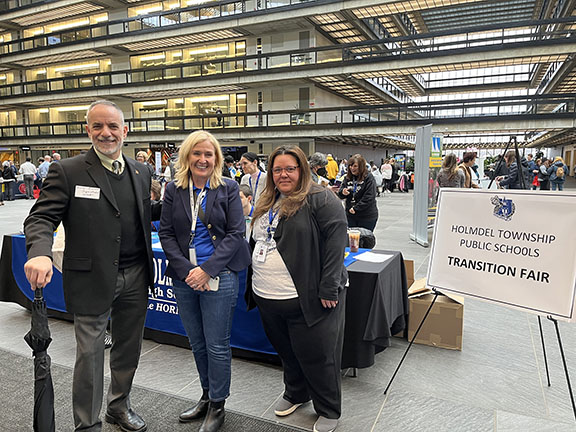
By Sunayana Prabhu
HOLMDEL – The township and school district collaborated to organize an inaugural transition fair for high school students with intellectual and developmental disabilities to help them transition to independent adult life after school.
The fair, held at Bell Works March 14, connected families, teachers and caseworkers with nearly 20 vendors offering services, from college and university education programs, employment support agencies and health care agencies, to transportation services and more.
Transition planning in New Jersey begins at age 14 or younger if appropriate. But the transition from age 18 to 21 into independent adult life is a “momentous” one for students with special needs, said J. Scott Cascone, Ed.D., superintendent of Holmdel Township Public Schools. The fair was envisioned as an opportunity to help students and parents “as they take the baton from the schools” after 16 years of being in the school system.
Several parents at the fair said the issue is for those who have had structure from years of being in a school system. “It’s challenging when they age out, especially for working parents, if there isn’t a place for them to go to,” said Mary Pierson, a Holmdel parent who was looking for opportunities to transition her 19-year-old son into a “productive life.”
Special programs in public schools support students with an IEP (Individualized Education Plan) from preschool until they age out of school services, around 21 years of age. While they are in school, the education officials assess their needs and provide comprehensive, individualized support in the form of behavioral and developmental services like occupational, physical and speech therapy, in addition to academic help to meet milestones.
“These children are assessed at a young age,” Pierson said, noting the system for them to access services when they age out of school needs to be “simplified.” Pierson suggested IEPs that document a student’s progress each year should be transferred into a system as children progress into adulthood, since the documents already contain all the relevant information. “It shouldn’t be so challenging having to do all the paperwork.”
She also added that the paperwork is in English and discounts non-English-speaking parents. The system, she said, should be “inclusive to all at a national scale,” and the process should be accessible to everyone, not just “higher income and the higher educated people because they’re asking the questions.”
“It should be based upon the child and their needs,” Pierson said.
The fair included government and private agencies that provide support to those with intellectual and developmental disabilities, as well as community groups that are working to develop local resources in the areas of independent living, recreation and higher education.
The Division of Vocational Rehabilitation Services (DVRS) and Division of Developmental Disabilities (DDD) are both state and federal agencies that provide employment support for job placement, job coaching, day programming, therapies, transportation and more. Information for both programs is available from a school’s child study team.
DVRS of Monmouth County, which is part of the New Jersey Department of Labor and Workforce Development, had set up its booth at the transition fair with information on employment and career services. According to details on promotional materials, DVRS is listed in a student’s high school IEP. Students can get services to bridge the gap between individual needs and employment, which may include assistance to enroll in a trade school to learn additional skills, or provide assistive technology in the workplace, like a modified vehicle.
Brookdale Community College offered a host of noncredit certificate courses in health care, project management, truck driving, coding and programming, tailored for students who may not want to take the college route but need a certificate to get a job in one of these fields.
Several other private support agencies of- fered their services at the fair, like Keeping Independence Services & Supports (KISS) and MOCEANS Center For Independent Living Inc. Some of their services are free at the referral of DVRS or DDD. The agencies offer workplace readiness, job placement, counseling, and self-advocacy, among other services connected with independent living.
However, educators at the fair echoed the concerns of many parents that the biggest hurdle in achieving any independence out of school is transpor tation. School districts provide transportation to students with IEPs but that service ends when the students age out.
“There’s very limited access to transportation for students with developmental disabilities,” said Amanda Dorvin, Red Bank Regional transition coordinator. “How are they going to get to the job once they are employed? That seems to always be our biggest challenge.”
“Especially in our area,” said Brooke Brigham, Middletown South High School transition teacher. “We don’t have a public transportation and it’s either Uber or other companies but it’s not always convenient or cost-effective for the families or the students.”
Public transportation services like Access Link have an application process, Dorvin said, but those services may have a “window” of time for drop-off and pickup, a problem as most jobs require an employee to arrive at a specific start time and leave when their shift is over.
Regardless of these hurdles, there are many positive stories that are encouraging and highlight an ecosystem designed for the success of differently abled students.
Frank Halpin, vocational representative of the job training and placement agency Ken’s Krew, Inc., said one of his students with cerebral palsy got an internship in the second year of accounting school. During that internship the student found a $10,000 error. “That ended up turning into a job offer. He’s been there since making about $48,000 a year,” said Halpin.
He proudly added another example of a young student diagnosed with autism spectrum disorder who is now working for Chase Manhattan with a six-figure salary. Halpin urged companies to “learn about their capabilities, not just their disabilities.”
The responsibility of a transition team is to empower students with resources as they step out of school so that “their last day with us looks like their first day when they exit,” said Michael Welter, transition teacher at Holmdel schools.
Amanda Lamoglia, director of special services for the district, who spearheaded the transition fair, said the school starts working on the transition of IEP students from age 14 by collaborating with DDD and DVRS, but the objective of the fair was to provide community, additional resources and more awareness so “parents do have a choice when they get older as to what agencies to choose,” said Lamoglia.
Over two dozen school districts in and around Monmouth County participated in the fair which is envisioned to be an annual event.
The article originally appeared in the March 23 – 29, 2023 print edition of The Two River Times.














